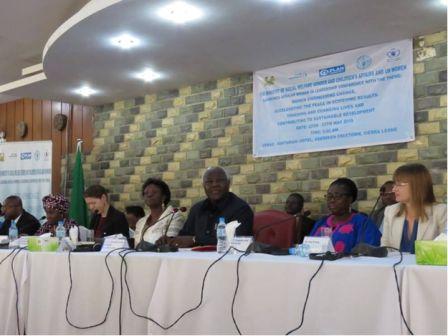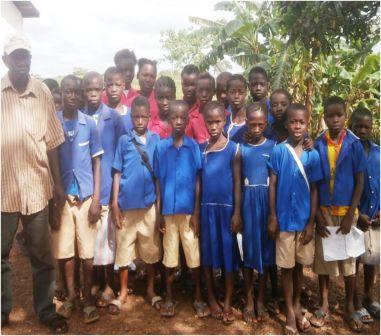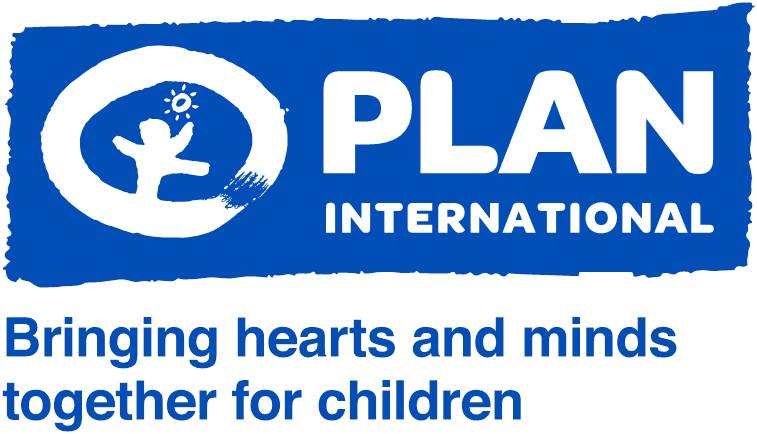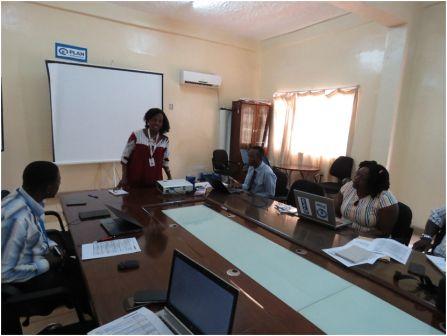President Koroma launches 3 day African Women Empowerment Conference
WOMEN IN LEADERSHIP STARTS WITH PRIORITIZING GIRL CHILD EDUCATION – Says Casely Ato Coleman
Yesterday marked another milestone in the history of women’s empowerment in Sierra Leone as the Ministry of Social Welfare, Gender and Children’s Affairs and UN Women in collaboration with Plan International Sierra Leone, the Food and Agricultural Organization (FAO) and the World Food Programme (WFP) organized a three-day Leadership Conference for African Women Empowerment at the Bintumani Hotel Conference Room from 23rd -25th May, 2016.
The theme of the three-day conference was “Women Engineering Change, Accelerating the Peace in achieving Results, Touching and Changing Lives and Contributing to Sustainable Development.”
The opening ceremony of the international conference was attended by Ambassadors, Parliamentarians, Ministers, senior Government officials, representatives of international organizations and many other dignitaries.
In her welcome remarks, the President of Women’s Forum, Miss Maude Peacock, emphasized that a lot has been done as evident in the number of participants backed by political will that saw the First Gentleman of the Republic of Sierra Leone, President Dr. Ernest Bai Koroma, in attendance.
In her statement, the Minority Leader in the Sierra Leone Parliament, Hon. Dr. Bernadette Lahai, who is also Vice President of the Pan-African Parliament, spoke on the role of the African Parliament and the Sierra Leone Parliament in promoting women.
She emphasized on giving more support to women and girls’ empowerment through education and advocacy in order to change the mindset of the public about women’s participation in society.
Hon. Dr. Bernadette Lahai stated that community engagement with special reference to home campaign on perception change about women issues and empowerment was key.
The Ambassador of the Islamic Republic of The Gambia, H.E. Mrs. Fatou Ndeye Gaye, appealed to all to give direct and indirect help to female species and advised girls to be serious with opportunities given to them.
The Ambassador asserted that when women are given opportunities, it benefits the whole family, but when men are given opportunities, it might not benefit the whole family.
The Federal Republic of Nigerian High Commissioner to Sierra Leone, H.E. Mrs. Gladys Modupe Quist-Adebiyi, explained the Nigerian experience in women empowerment since President Ibrahim Babagida’s regime to date.
Irish Ambassador to Sierra Leone, Dr. Sinead Walsh, spoke on the need for education and parenting as people relate to the way they are brought up and educated.
She furthered that when children, especially girls, drop out of school, it affects the next generation; therefore, there is need to integrate pregnant girls into the normal school system, provide mentorship for girls and reflect the recommendations of women into the current constitutional review process that is ongoing.
The President of Children’s Forum Network Sierra Leone, Miss Paulina Bangura, said she was not going to state protocols and conventions because it was time to walk the talks, noting that although President Koroma has done an exemplary work for women’s empowerment, they are still faced with increased victimization. She called on the public to support women’s empowerment for a better Sierra Leone.
The Minister of Social Welfare, Gender and Children’s Affairs, Dr. Sylvia Olayinka Blyden, said to achieve the 30% quota of women empowerment, they need the support of men.
As women, she said, they need to recognize men who are supporting women empowerment. That is why the Minister said it is worth praising the President for his exemplary role in promoting women empowerment.
Dr. Blyden said the President has created more jobs for women, noting that apart from the eleven ministerial and ambassadorial positions he has given women, he has shown the political will for which he needs to be praised especially in enhancing gender equity.
According to the Plan International Sierra Leone Country Director, Casely Ato Coleman, in 2015 world leaders agreed an ambitious set of goals for development specifically the SDG5 which is to “Achieve gender equality and empower all women and girls”. He warned that they will only be achieved if we can unlock the power of girls, otherwise girls will continue to be left behind.
The Country Director said Plan International as one of the oldest (1937) and the 5th largest INGO in the world, working in 71 countries is dedicated to ensuring gender equality and upholding the rights of girls and young women by 2030.
“We have a vision of a world that values girls, promotes their rights and ends injustice.” Mr. Coleman said, adding that Plan International Sierra Leone’s purpose is to strive for a just world that advances children’s rights and equality of girls.
Mr. Coleman listed a few of the interventions Plan has been doing globally, regionally and within Sierra Leone to promote girls rights and women empowerment.
At the global level, the Country Director said, for the last decade, Plan International’s annual State of the World’s Girls Report has taken a thematic look at the issues facing girls around the world, ensuring the power of women and girls’ voices through first-hand interviews and the use of innovative perceptions-based data.
He intimated that within the new sustainable development agenda, Plan International is launching a new data tracker that will be the successor to the State of the World’s Girls report, noting that Plan International, alongside other partners is developing a powerful new data tool that will enable them hold governments to account for progress on the SDGs.
In the West Africa region, Mr. Coleman said child marriage has emerged as a flagship issue driving both the research and advocacy agenda for Plan International West and Central Africa regional level.
He said this region is considered a hot-spot in terms of incidences of child marriage and is host to countries with the highest rate of child marriage across the globe.
The Country Director disclosed that in total, six million of the world’s child brides live in West Africa, noting that Plan International has invested heavily in qualitative research aiming at understanding and explaining local processes and specificities of child marriage and to identify drivers of change that can be used for evidence-based interventions in countries across the region.
At the continent wide level, Mr. Coleman said Plan International is one of the key partners of the African Union campaign to end child marriage and the Plan Africa Union Regional Office and the Plan AU Office are key actors in the roll-out of Africa Union campaign to end child marriage in Africa.
He also said Plan International Sierra Leone is lifting girls and women up in Sierra Leone through the following intervention: Girls’ Education under the DfID funded Girls Education Challenge Program (which has won a UK charities award recently), Plan is supporting 29,077 girls in vulnerable communities with educational assistance and study opportunities to pass their exams. 85% of these girls passed their selective exams, 499 young girls who could not have their WASSCE requirements have been supported to acquire their Teachers Certificate, thereby increasing the number of female teachers in schools; Harmful Practices – Plan International Sierra Leone’s flagship projects targeting girls; My Body Right, enhances the prevention of harmful traditional practices in Bombali District which will be extended to Koinadugu District from July 2016; Child Marriage Legal Reforms – under the supervisory oversight of the Ministry of Social Gender and Children’s Affairs, Plan is leading a coalition of like-minded organizations like Save the Children UK, World Vision, UNICEF, UNFPA and others to review and harmonize conflicting provisions in the Child Right Act 2007 and the Registration of Customary Marriage and Divorce Act 2009, to protect girls from early marriage; Teenage pregnancy – Plan is also working with the Office of the First Lady and wife of the Vice President and a coalition of organizations to ensure girls are protected from teenage pregnancy, that is, No ‘Belleh’ before BECE advocacy and ENIQUE projects; Women in Agriculture – Plan International in collaboration with the Ministry of Youth Affairs (MOYA) is investing in the national youth farm at Masiaka. The primary aim of this project is to encourage young men and women on agricultural production, provide long term skills training knowledge on agro-base technology and secure job opportunities.
Following a visit to the farm by the Ghana High Commissioner, the Ghana High Commission in Sierra Leone has also made a commitment to MOYA to bring the Government of Ghana on board to provide further technical support to the farm. Mr. Coleman said Plan will support Government to scale this up to other districts in the country as this was a very good project helping to build community resilience after Ebola.
The Country Director also spoke on Institutional Strengthening. According to him, Plan is also supporting the National Commission of Children to develop their strategic plan that will also focus on protecting the rights of girls and boys, adding that they are also involved in the Rehabilitation of Sector Ministry Building which is why Plan has rehabilitated the Ministry of Social Welfare, Gender and Children’s Affairs building as part of Plan’s 40th anniversary celebrations in Sierra Leone which he said was a demonstration of their continued support to Government to lift girls and women up.
Human Resources Management
- In walking the talk, Plan International Sierra Leone has promoted gender equality and the advancement of women within the organization.
- At institutional level, the regional office has launched an ambitious programme aimed at building a pool of well-trained young female professionals across the West and Central Africa region ready to take on their first jobs. This programme will contribute to providing fresh graduates with life changing opportunities. Through their internship, young women will acquire the needed knowledge and skills to improve their employability and be competitive in the labour market.
Mr. Coleman disclosed that Plan did the first ever graduate recruitment fair immediately after Ebola in which almost 700 young people participated and through a free and transparent process, built a strong database of young men and women some of whom have already been employed in Plan International.
He said Plan has identified female high performing staff that has been put on a fast-track to develop into senior roles; some are already managing big grants funded programmes and others on international assignments.
The Country Director furthered that Plan has also established a mentoring programme where distinguished female leaders visit their offices to deliver women in leadership skills development programme and they have already hosted the Deputy Ministry of Education, Science and Technology (MEST) Dr. Christian Thorpe, and Professor Felixtina Jonsyn-Ellis, who until recently was the Deputy Vice Chancellor, Njala University.
Mr. Coleman also disclosed that Plan International Sierra Leone at present has a 50/50% in senior management. According to him, this is a deliberate attempt to support female staff managers, and a venture that has been applauded by their international office as the only office in Plan International worldwide that has achieved this goal.
The Country Director maintained that Plan is one of the best “family friendly” employers in this country with staff wellness centre, child friendly space for nursing mothers, a four months paid maternity leave for female staff, flexible working hours policy for female staff and many more suitable conditions.
Mr. Coleman informed that the starting point to build women’s leadership is to prioritize girl-child education, adding that it takes political will and global commitment to move towards a more gender equitable leadership environment.
Hear him: “Through the SDG, the global commitment has been achieved, but it takes individual commitment to put them into action and this will not come from the women themselves alone but also needs a movement with leadership as being shown here today by UNWOMEN to demonstrate that world leaders decide on the right thing to do when together they declare SDG5 “Achieve gender equality and Empower all women and girls”, Mr. Coleman stated.
He congratulated the Country Director of UNWOMEN Sierra Leone, Dr. Mary Okumu, and the Minister of Social Welfare, Gender and Children’s Affairs, Dr. Sylvia Blyden, for their leadership towards hosing the important conference.
In his keynote address, President Dr. Ernest Bai Koroma highlighted the gains his Government has made during the last eight years in office albeit he recognized that there are many challenges but they are not there yet. He promised his Government’s commitment to gender equity and women empowerment.
President Koroma maintained that because of his Government’s commitment to gender equality and woman empowerment, it has created more opportunities for women and also paid more school fees for an increased number of girls as well as provided scholarships for female students studying sciences than any government ever in Sierra Leone. “Women are the mainstream of our resilience,” the President Koroma emphasized.
The President also highlighted the sacrifices women made to end the 11 years of civil conflict in the country, political transformation and the fight against Ebola.
“My Government recognizes the great effort of women; this is why violence against women is violence against the state. Our Agenda for Prosperity prioritizes women and, therefore, before the end of my time in office we will ensure we establish the Women Commission to champion their affairs in attending the 30% quota,” President Koroma assured women.
He also promised to work out all machinery to raise funding for women empowerment and gender equity.
Other speakers at the programme included Miss Inga Kristina of the European Union, Mr. Geoffery Wiffin of UNICEF who pledged the organization’s support to women empowerment in Sierra Leone.
The chairperson of the programme was the Deputy Minister of Social Welfare, Gender and Children’s Affairs Madam Neneh Rugiatu Turay, while the Director in the Ministry of Social Welfare, Gender and Children’s Affairs, Mr. Charles Vandi, who in his vote of thanks called on all men to support the campaign in promoting women empowerment and gender equity.
Stay with Sierra Express Media, for your trusted place in news!
© 2016, https:. All rights reserved.







